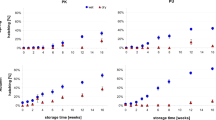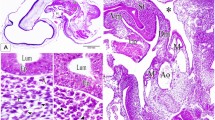Abstract
IT is known that chicken embryos show great variation in their rate of development. This is due to three main factors: variations in the latent period, variations in the environmental factors of incubation and the inherent variations of the embryos themselves1,2. Some, or possibly all, of these factors are likely to occur under natural conditions within a single clutch of eggs, and particularly in species which incubate large clutches.
This is a preview of subscription content, access via your institution
Access options
Subscribe to this journal
Receive 51 print issues and online access
$199.00 per year
only $3.90 per issue
Buy this article
- Purchase on Springer Link
- Instant access to full article PDF
Prices may be subject to local taxes which are calculated during checkout
Similar content being viewed by others
References
Lillie, F. R., The Development of the Chick, revised by Hamilton, H. L. (New York, 1952).
McNally, E. H., and Byerly, T. C., Poult. Sci., 15, 280 (1936)
Witherby, H. F., Jourdain, F. C. R., Ticehurst, N. F., and Tucker, B. W., The Handbook of British Birds, 5 (London, 1949).
Author information
Authors and Affiliations
Rights and permissions
About this article
Cite this article
VINCE, M. Synchronization of Hatching in American Bobwhite Quail (Colinus virginianus). Nature 203, 1192–1193 (1964). https://doi.org/10.1038/2031192a0
Issue Date:
DOI: https://doi.org/10.1038/2031192a0
Comments
By submitting a comment you agree to abide by our Terms and Community Guidelines. If you find something abusive or that does not comply with our terms or guidelines please flag it as inappropriate.



